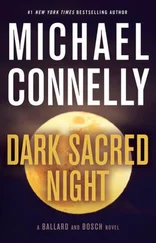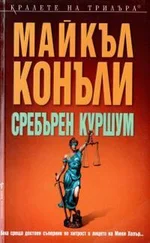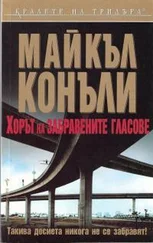I realized I wasn’t going to be able to make any headway with her. She had her answers rehearsed. I had to wonder whether she had been following the case in the media.
“Yesterday morning the judge asked for a show of hands for anyone who had read about this case in the media. You did not raise your hand, correct?”
“That’s correct. I had never heard of it before.”
I didn’t believe her. She knew about the case and for some reason wanted to be on the jury. I checked my watch and moved on to Mr. 17. I had no choice.
“Sir, you are an assistant principal at a private elementary school, correct?”
“Yes, that’s right.”
“I see on the questionnaire that you have a master’s degree in education and are working on a doctorate.”
“Yes, part-time on the doctorate.”
“Is there a reason why you haven’t chosen to teach at the university level?”
“Not really. I like working with younger kids. That’s where I get my fulfillment.”
I nodded.
“It says you also coach the boys’ basketball team at the school. Does that require a lot of physical activity on your part?”
“Well, I think the boys should see their coach as someone who can keep up with them. Someone in shape.”
“You do strength-training exercises with them?”
“Uh, sometimes.”
“You run with them?”
“I do laps in the gym with them.”
“What is your philosophy on sport? Winning is everything?”
“Well, I’m competitive, yes, but I don’t think winning is everything.”
“What do you think, then?”
“I think winning is better than losing.”
That drew some polite laughter. And I changed the direction of my questions.
“Your wife. According to the info sheet, she is a teacher as well?”
“Yes, same school. We met there.”
“So I assume you carpool to school together?”
“No, I have the coaching after school, and she has a part-time job at a crafts store. So different schedules, different cars.”
“Do you think that there are serious crimes and not serious crimes?”
“Excuse me?”
“Do you think that there are some crimes that shouldn’t be considered crimes?”
“I don’t really understand.”
“I guess I’m talking about the highs and lows. Murder — that’s a crime, right?”
“Yes, of course.”
“And those who murder should pay for their crimes. You agree?”
“Of course.”
“What about smaller crimes? Crimes where there are no victims — should we bother with those?”
“A crime is a crime.”
The judge intervened again.
“Mr. Haller, do you intend to question juror twenty-one with the time you have left?” she asked.
I was annoyed at the interruption. I was building toward a decision with 17 and she shouldn’t have interrupted.
“As soon as I’m finished here, Your Honor,” I said, my frustration clear in my voice. “Can I proceed?”
“Go ahead,” Warfield said.
“Thank you.”
“You’re welcome, Mr. Haller.”
I turned back to 17 and attempted to gather my splintered momentum.
“Sir, is a crime a crime, no matter how big or small?”
“Yes. Of course.”
“What about jaywalking? It’s against the law but do you think it’s a crime?”
“Well, if that’s what the law is, then, yes, I guess it’s a crime. A minor crime.”
“What about parking in a handicapped zone when you have no handicap?”
It was a gamble. All I knew about 17 was what I had read on the questionnaire and what I learned in the text from Cisco about his parking in a handicapped spot. I had to make a call on him but could only dance around the essential question: Was he a cheater?
We stared at each other in silent communication before 17 finally spoke.
“There might be a reasonable explanation for someone doing that,” he said.
There it was. He didn’t believe he needed to play by the rules. He was a cheater and he had to go.
“So what you’re saying is that—”
Warfield interrupted again.
“Your time is up, Mr. Haller,” she said. “Counsel, approach.”
I cursed under my breath and turned away from 17.
We had been handling challenges at the bench so the objections to jurors — possibly embarrassing to them — were not made in open court. But when I got to the bench, I was too hot to worry about keeping my voice down.
“Your Honor, I need time to question the last juror,” I said. “You can’t arbitrarily set my time based on what time the state needed. That is patently unfair to the defense.”
Maggie had joined the conference at the bench. She now lightly touched my arm as the judge responded. It was a warning to tread carefully.
“Mr. Haller, your time management is not my problem,” Warfield said. “I made it abundantly clear from the start of day yesterday, start of day today, and at the start of your most recent questioning of potential jurors: we are going to finish jury selection today and opening statements are tomorrow. We are now approaching three o’clock and we still have alternates to seat and I imagine at least one or two jurors. Your time was up. Now, does either of you have a challenge?”
Before Berg could say a word, I spoke.
“I would like to confer with counsel first,” I said. “Could we take the afternoon break and then consider challenges?”
“Very well,” the judge said. “Ten minutes. Step back.”
The lawyers returned to our tables while the judge informed the courtroom of the afternoon break. She sternly said that court would resume in ten minutes sharp. I slid into my seat and huddled with Maggie.
“This is crazy,” I said. “Fifteen minutes to question three jurors? She’s nuts, and this is reversible.”
“Look, you have to calm down, Mick,” Maggie said. “You can’t cross swords with a judge before the trial even starts. That’s suicide.”
“I know, I know. I’ll be calm.”
“Now, what are we going to do? We only have one challenge.”
Before answering, I looked over and saw that Berg was also huddling with her co-counsel — the bow-tie guy. I had an idea. I looked back at Maggie.
“How many challenges do they have left?” I asked.
She looked at a score sheet she was keeping.
“Three,” she said.
“I don’t want to give up ours,” I said. “I want to try something. I want you to go into the hall for the break. Don’t come back until the ten minutes are up.”
“What?”
“Don’t worry about the challenges yet. Just go.”
She tentatively got up and went out through the gate toward the door to the hall. I checked the prosecution table and then turned toward Chan, the courtroom deputy, and signaled him over. I opened my file, revealing the ice-cube tray chart. I quickly switched the Post-its I had used to mark jurors 21 and 17, putting the green light on the schoolteacher.
The deputy stepped over.
“I gotta use the can,” I said. “Can somebody take me back?”
“Stand up,” he said.
I did as instructed. Chan handcuffed me and walked me to the custody door.
“You’ve got about five minutes,” he said.
“I only need two,” I said.
He led me into the secured holding area and into a cell where there was an open toilet. There were two men sitting on a bench in the cell, at this hour most likely waiting to be transported back to Twin Towers after their court appearances. I stood at an angle preventing them from seeing my business and urinated into the toilet while Chan waited in the hallway outside the cell.
I took my time washing my hands in the sink next to the toilet. I wanted to give the bow-tie guy enough time to see that I had left my chart open on the defense table.
Читать дальше
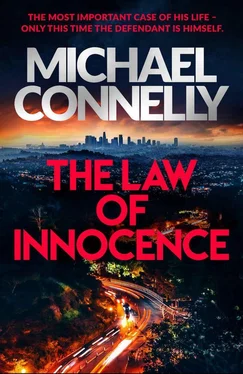

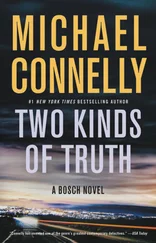

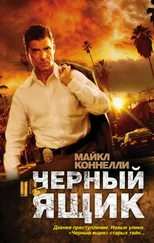
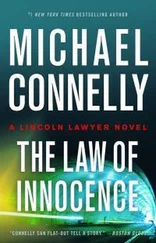
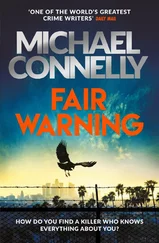
![Майкл Коннелли - The Night Fire [Harry Bosch - 22]](/books/405630/majkl-konnelli-the-night-fire-harry-bosch-22-thumb.webp)
